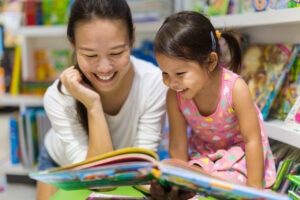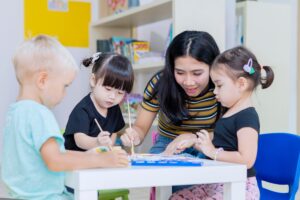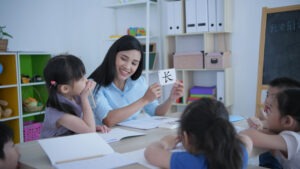BACK
What Your Child Learns in Preschool Across Different Ages
Preschool marks an essential milestone in a child’s educational journey, building blocks for future academic and social success. While preschool may seem like just the beginning of their academic journey, it is a key stage where foundational skills are developed and nurtured. From the tender age of toddlers to the more developed preschoolers, each stage brings unique learning experiences crucial for holistic development.
When parents understand what their child learns in preschool, they can be more involved in their child’s education, provide support where needed, and foster a love for learning that will benefit them in future.
Let’s explore what children typically learn in preschool across different ages.
Toddlers (1 to 3 years old)
Exploration
Toddlers are natural explorers, and preschools provide a rich environment to satisfy their curiosity. In this age group, children learn through hands-on experiences, engaging with various materials and sensory activities.
From sand and water play to building blocks and art supplies, every interaction contributes to their cognitive and motor skill development.
Language development
Preschool is a pivotal time for language acquisition. Toddlers are like sponges, soaking up new words and expressions as they navigate their environment.
Through storytelling, songs, and conversations with teachers and peers, children enhance their vocabulary, grasp grammar rules, and begin to articulate their thoughts and feelings.
Social interaction
Socialisation is a vital aspect of preschool education. Toddlers learn to navigate social dynamics, take turns, and cooperate with others. Group activities like circle time and collaborative play foster essential social skills like empathy, sharing, and conflict resolution.
These early interactions lay the groundwork for healthy relationships in the future.
Basic concepts
In preschool, toddlers are introduced to fundamental concepts crucial for later academic success. Engaging in playful activities, they explore colours, shapes, numbers, and letters, promoting cognitive development. They gradually internalise these abstract concepts through repetition and reinforcement.
Moreover, these activities cultivate a natural curiosity for learning, sparking enthusiasm and eagerness to explore the world around them.
Preschoolers (4 to 6 years old)
Literacy
As preschoolers mature, literacy becomes a primary focus. Through storytelling, phonics exercises, and exposure to written language, children develop pre-reading skills essential for literacy acquisition.
They learn to recognise letters, understand their sounds, and eventually start decoding simple words, setting the stage for reading success.
Numeracy
Numeracy skills are fundamental to mathematical understanding in preschool. Engaging activities like counting games, sorting exercises, and introductions to basic maths concepts help preschoolers develop foundational numeracy skills.
They learn to recognise numbers, engage in simple calculations, and explore mathematical concepts through hands-on experiences, fostering a solid foundation for future mathematical learning and problem-solving abilities.
Social-emotional skills
Preschool years are critical for the development of social-emotional competence. Through guided interactions and emotional support from teachers, children learn to manage their emotions, manage stress, and develop resilience.
They also cultivate empathy, kindness, and a sense of belonging within their peer group, which is essential for healthy social relationships.
Primary school readiness
Preschool serves as a bridge between early childhood and formal education. As children approach primary school age, the preschool curriculum increasingly focuses on preparing them for the academic and social demands of formal schooling.
Activities such as following instructions, completing tasks independently, and developing concentration skills help preschoolers transition smoothly to the next phase of their educational journey.
Little Skool-House: A Good Start to Early Learning
Preschool shapes a child’s development, providing them with the skills and knowledge they need to succeed in school and life. Institutions like Little Skool-House deliver high-quality early childhood education, so you can have peace of mind knowing your child is equipped with the skills they need to flourish.
Little Skool-House is a top preschool in Singapore, offering a nurturing environment where children can thrive. Our curriculum is designed to cater to the unique needs of each age group, ensuring that children receive an education that fosters their development across all domains.
Through play-based activities, interactive lessons, and individualised attention from qualified educators, Little Skool-House children develop confidence, curiosity, and a love for learning that will serve them well throughout their educational roadmap and beyond.



